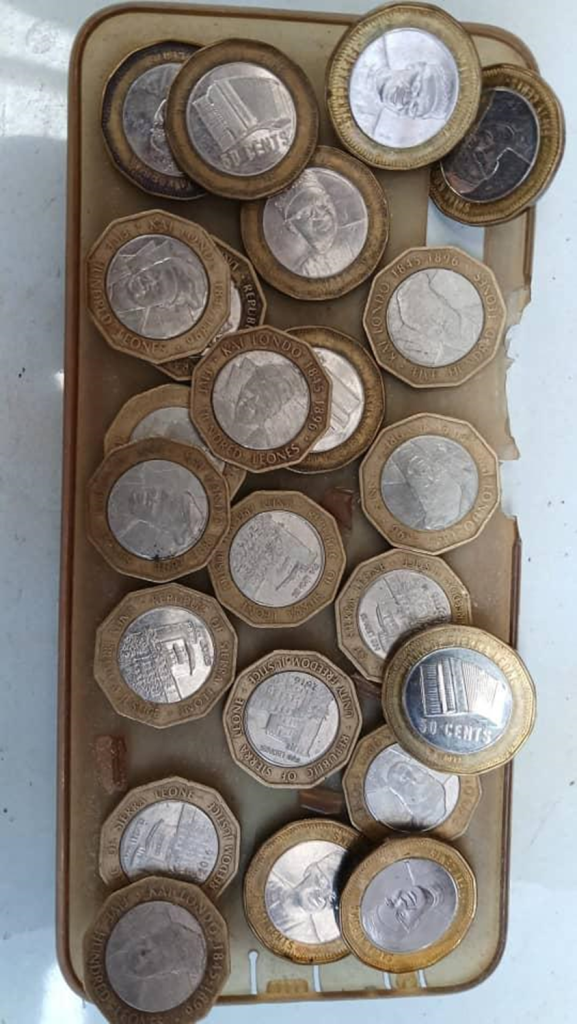By Alfred Koroma

the last coin in circulation
After Concord Times published a story on the decline of coins in late September 2024, Bank of Sierra Leone (BSL) reacted, announcing in a press statement that it had minted sufficient coins to service the economy.
In the press release, BSL claimed that coins of 1 cent, 5 cents, 10 cents, 20 cents, and 50 cents denominations were in circulation. However, four months after this announcement, not a single coin is seen in the market. Instead, the 1 Leone note is acting as a substitute for the coins.
Why have the coins disappeared?
For decades, coins have been vital in daily transactions in the country, often used for small-value transactions, especially in informal sectors like markets, street vendors, and public transportation.
Announcing the change of currency, BSL had assured the public the new money would be circulated along with a huge amount of coins equivalent to the ones replaced.
But since the money was introduced in July 2022, coins have not been seen in circulation as promised earlier by the government. The few that were in circulation before the redenomination, are no longer useful due to high inflation.
Speaking to Concord Times in relation to the decline of coins in September, Economist, Prince Jacob Macaulay said coins have disappeared because of wrong ‘fiscal and monetary policies’ and government decision to redenominate the currency without putting the required measures in place.
“There was no proper mechanism for the introduction of the new Leones, ” he said, also hitting on the lack of transparency in the redenomination process and government refusal to disclose the amount of the new currency printed and the one that was in existence at the time the redenominated currency was introduced.
The redenomination was done as a response to the shortage of the Leone in commercial banks between June 2020 and July 2021 that compelled the Central Bank to resell its Forex reserves.
This was a period the country experienced a significant rise in inflation. According to analysis from Focus Economics and WorldData, the country recorded an inflation rate of 13.4% in 2020. And by 2022, this rate had more than doubled, reaching 27.2%. The upward trend continued into 2023, with the inflation rate escalating to 47.6%.
The sharp increase in inflation over the three-year period significantly impacted the cost of living and economic stability in the country.
This began increasingly reducing the purchasing power of the 500 Leones coin, the only useful coin by then. What was sold at 500 Leones became 1,000 Leones and 2,000 Leones. For example, some vendors started refusing to sell a sachet of drinking water for 500 Leones. Instead some preferred selling one sachet for Le1, 000 (which is now 1 Leones) or three sachets for Le2, 000 (2 Leones).
As of 2024, Sierra Leone’s annual inflation rate decreased to 15.41% and the International Monetary Fund (IMF) projects that the country’s inflation rate will stabilize around 17% in 2025.
But the impact of the decrease has not been felt in the market. The price of basic commodities like rice, fish, pepper, cooking oil etc. remain high. And the cost of drinking water remains the same.
What does the absence of coins means for the economy?
Coins are essential for low-value transactions, especially in informal markets. Without them, consumers may face difficulties in exact pricing, often leading to rounding up prices. These price adjustments may explain why the recent decline in inflation has not translated into reduced costs for basic commodities.
Just as Economist Prince Jacob Macauley noted that “The non-circulation of coins has a negative effect on the economy.”
Because there are no coins, some traders say they adjust prices to avoid losing revenue. For cheaper items, Mohamed Barrie, a shop owner, said as business people, they have found a way of handling them since there are no longer coins – they round prices up and put more cost on the consumers.
In an interview last year Barrie told Concord Times that a sweet (candy) is supposed to be sold at 5 cent, but because there are no coins, they are selling candy for Le1, an easy way of avoiding the burden of having to look for coins to give customers change.
“Most of the things we buy now traders request from Le1, Le2, and Le5 and above. We don’t buy with coins anymore,” Yusif Mansaray, a Teacher and a resident at Shell in the East of Freetown, told Concord Times.
“To me, this means our economy is not doing well. One-way-or-the-other, our economy is dropping,” he stated.


